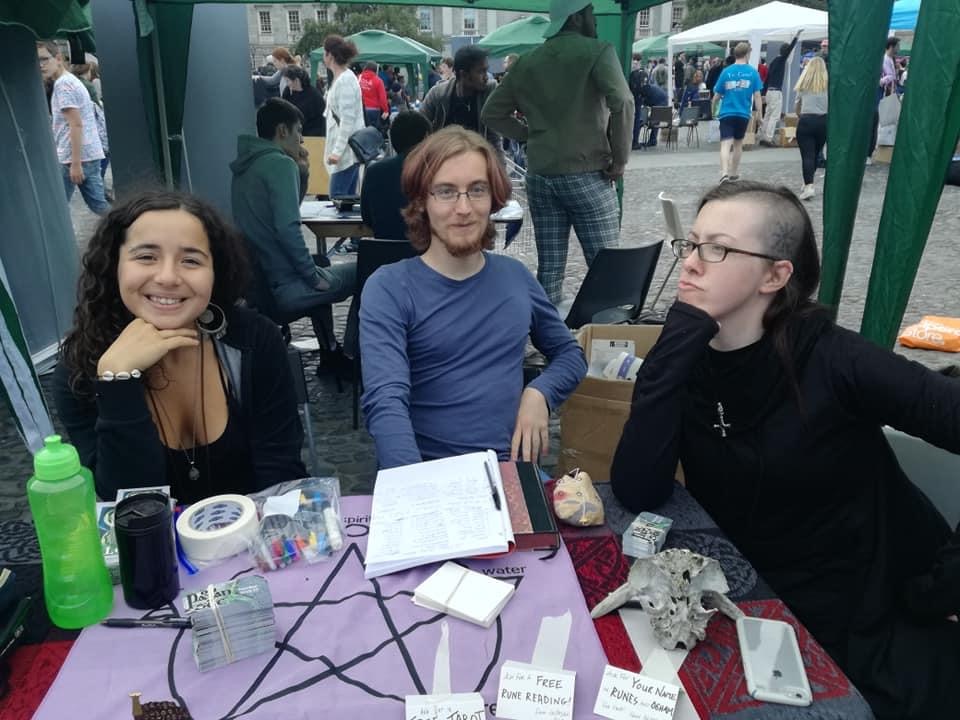What is Paganism? The term is loosely defined as a polytheistic nature-worshipping religion that is the ancestral religion of the whole of humanity. From the Latin pāgānus meaning “rural”and later “civilian”, how is this belief system incorporated into student life at Trinity? I spoke with Ian Creedon, Chairperson of DU Pagan Society (Pagan Soc), to find this out.
When asked what it is that Pagan Soc does, Creedon humorously replied saying: “Sometimes I’m not entirely sure myself!” The third-year Classical Civilisation and Greek student explained that they are a society for students interested in Paganism, which is “an extremely broad term that encompasses both the beliefs of practices of historical people and modern religious movements inspired by them, such as Wicca”. For those who aren’t in the know, Wicca is a belief that affirms the existence of supernatural powers (such as magic) and of deities who are inherent in nature while emphasizing ritual observance of seasonal and life cycles.
With most of their members being from Europe, in practice the society mostly focuses on European pre-Christian religion but is open to cultures from all across the world. “We do educational talks, discussion groups, film screenings, group trips – this year for Samhain we went to Glasnevin Cemetery, and indeed the occasional ritual,” said Creedon.
In terms of worship and religion, Pagan Soc is not strictly a religious society – both by not being allowed to be by college, and by the wide range of personal beliefs among members in which they “couldn’t be the least bit doctrinaire.” Creedon expressed that Pagan Soc for some of its members, including himself, is concerned with personal spiritual beliefs: “We’re a cultural interest society.” For others also, it is purely an academic interest and some in between. When asked if education of Pagan rituals and beliefs are important to the society, he said: “We have some events which are purely educational about the religious beliefs and practices of historical people and we have others that are directly spiritual in nature, such as our first event this year which was for the Autumn Equinox, but we never presuppose any particular beliefs on the part of our members – everyone of every persuasion is welcome to attend our events.”
“Pagan Soc have successfully held two divination events this term.”
Pagan Soc have successfully held two divination events this term. The first involved an open discussion about what the term “divination” means to people, its theoretical background and different ways of approaching it. “For instance, whether it’s literally magic or how it can still be useful as a tool of psychological exploration even if you believe the results you get are purely random”, Creedon mentioned. He described their second divination event as more hands-on and the society’s Treasurer Sé , who is a practicing witch, talked through how to participate in divination with the likes of tarot cards and Norse runes.
The spiritual Pagan Soc collaborates with a range of Trinity’s societies. All this term they held a witchcraft-themed murder mystery roleplay with DU SciFi, a Day of the Dead collaboration with DU Hispanic Society, and many readings and discussions alongside Lit Soc and DU Gender Equality Society (DUGES). “We’re good friends with Metafizz as well and had several collabs with them last year”, said Creedon. From joining up with so many diverse societies, it clearly shows how open Pagan Soc really are to others beliefs and understanding new ones, and this relates to the society’s true message.
“Our main message is that spirituality is important, that some people’s spiritual interests and needs are met by ideas and practices that existed historically, but are no longer represented by mainstream religious organisations and that it’s good for those people to have some way to find each other and hang out – This is what the Pagan Soc always provides,” Creedon considered. He also mentioned that this message may somewhat alter to each member, but this would be the general society consensus.
Finally, as Pagan Soc is sometimes viewed as a more alternative society in Trinity, when asked what sort of reaction does the society receive, Creedon shared: “Most people aren’t really sure what to make of it or what a Pagan Society might even involve, but they tend to take a polite interest. A lot of people find it cool that there is a Pagan Society even if it isn’t for them, and we appreciate the support. I’ve had a few negative reactions from people who practice other religions, but that’s rare. So on the whole, the community is puzzled but positive towards us!”






